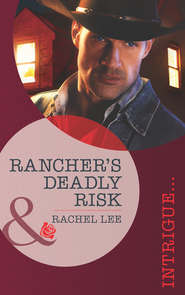По всем вопросам обращайтесь на: info@litportal.ru
(©) 2003-2024.
✖
A Soldier In Conard County
Автор
Год написания книги
2019
Настройки чтения
Размер шрифта
Высота строк
Поля
Outside, the January thaw had thinned the snow to almost nothing. Icicles were beginning to drop from the eaves, tiny spears for the most part, probably a good size for leprechauns.
The day faded rapidly toward early night. Miri hated waiting, but she couldn’t seem to do anything else just then. Finally, after what seemed like forever, a dark-colored car pulled up out front. A few minutes later she recognized the unmistakable figure of Gil York.
He looked different out of uniform, wearing a black parka, and as he came around the front of the car, she realized everything about him had changed.
The ramrod-straight posture and confident movement she associated with him were gone. He walked a bit gingerly, using a cane. He wore laced-up desert boots and camouflage pants beneath the parka, an odd assortment of pieces, and she wondered if the camo was simply comfortable, preferred over jeans or regular slacks.
He caught sight of her as she opened the door and gave a small wave. She noticed how deliberate his pace remained and the caution with which he navigated the sidewalk and the porch steps.
“It’s good to see you again, Gil,” she said when he reached the porch. She noted that sweat had beaded on his forehead, and it wasn’t an especially warm day, thaw or not. That walk must have been difficult.
“Come inside. I’ve got coffee if you want, and a casserole that’s just waiting to be popped in the oven.”
At last the rigid lines of his face cracked a bit, serving up a faint smile. “Thank you, Miri. Hard to believe that I sat through that long drive and I’m already looking for another seat.”
“You’ve been wounded,” she replied, stating the obvious. “It must take time to come back.” She opened the door wider and motioned him inside. Her house was small, the foyer about big enough for four people, with the living room on one side and the kitchen on the other. At least the kitchen was big enough to eat in. Two bedrooms and a bath at the back. Cozy. Easy to make crowded.
Gil was a large enough man that he was making her house feel even smaller. She guided him straight to the kitchen and pulled out a chair for him at the battered wooden table, which doubled as food prep space when she needed it. While he removed his parka, revealing a loden-green chamois shirt, she asked, “Coffee?”
“Please. Black.”
She placed a large mug in front of him, then slipped the casserole into the oven, which she had preheated more than an hour ago. That freed her to join him at the table.
“I was surprised when you said you wanted to visit,” she remarked. “Everyone’s glad you are, we just didn’t expect it. Was the trip rough?”
Again the faintest of smiles. “It’s a long way from Michigan by car. Some really great scenery, though. Mostly, it was peaceful.”
There was something important in the way he said that, but she felt she shouldn’t ask, not yet. He had an aura that made her feel getting personal might not be wise. That he didn’t easily allow it, if he did at all.
“How are Al’s parents?” he asked.
“One day at a time. Jack’s still running the ranch, although I think his heart has gone out of it. He planned to turn it over to Al when he left the army. Now it’s just something he needs to do. He’s muttered a couple of times that maybe he can find a Japanese buyer.”
Gil arched one dark brow. “Japanese?”
“Oh, that goes back a couple of decades at least. The Japanese were buying up cattle ranches in Montana, then having locals run them, so they could export the beef to Japan. I guess it was pricey there.”
“It’s pricey everywhere now.”
“Not that the ranchers are seeing most of that.”
He nodded. “I didn’t think so. Al used to talk about the ranch on occasion. Stories from when he was a kid, mostly, but he always had something to share when he came back from leave. And he was always pushing me to join him when we retired.”
“Did you want to?”
His eyes were like flint, showing only the faintest of expressions. “What do I know about ranching?”
That finally caused her to smile. “What did you know about special ops when you started?”
“Touché.” At last a real smile from him. So his expressions could change from distant to less distant, to even pleasant. He lifted his mug at last and drank deeply of the coffee. “Great joe,” he told her.
“Thanks. Listen, I’ve got a spare bedroom in the back, if you don’t mind that it has my home office in one corner. I can guarantee, though, that it’s nicer than the motel. And tomorrow Betsy and Jack are looking forward to seeing you.” She hesitated. “They’re throwing a barbecue for you.”
“A barbecue?” He raised one brow. “It’s January.”
“And there’s a thaw. Everyone’s looking forward to an early taste of spring. Anyway, you’re not obligated to come, but if you do you’ll get to meet some of Al’s old friends.”
He didn’t answer and she really didn’t expect him to. He’d asked if it would be all right to come for a brief visit, not to be swamped.
After a few minutes, realizing that even their email exchanges hadn’t really made them more than acquaintances, she spoke again. “You can bring your stuff in whenever you’re ready. Dinner will be in about an hour. And you can think about just what you want out of this visit. In the meantime, after that drive, maybe you need a nap?”
His gaze had grown distant, but it snapped back to her as she spoke. It was a penetrating look, and she didn’t doubt that she had his full attention.
“I’m sorry,” he said. “Yes, I’m tired. Yes, I’m still recovering. But the thing that wore me out most was my own family.”
She drew a breath. His own family? Oh, Lord, and she’d just suggested a big barbecue with Al’s friends and family. Gil was probably already wishing he hadn’t stopped by. “What happened?” she asked, before she could stop herself.
“For years now they’ve been demanding I get out of the military. My being wounded only strengthened it. They always feared I was going to come home in a body bag, and this time I came close. My dad’s a Vietnam vet, and he’s been pushing the hardest.”
“Oh.” She’d heard the same insistence from Betsy and Jack when Al came home. “Jack used to ask Al, ‘How many years, son? You’ve done your duty.’”
Gil nodded slightly. “Part of me understands. I’ve buried a lot of good men. I’ve seen a lot of terrible things. But this is who I am.”
It sounded like a line drawn in the sand. Being a soldier was his identity. How did you strip that away? She would find it hard to give up being a music teacher. Sometimes she wondered how jobs could become so overwhelmingly important to a sense of self. Wondering didn’t make it change.
“I’m not sure you’ll get much of that here,” she said. “But I can’t guarantee you won’t get any. Al’s parents are excited about seeing you because Al mentioned you so often they feel like you’re family. So, no promises.”
Again a faint smile. “I know how to leave. Obviously. But let’s talk about you. I know you teach music. I know you love it because you told me such great stories when you emailed. But what about the rest? Does Miri Baker have a life apart from school?”
She narrowed her eyes at him. “Does Sergeant Gil York have a life apart from the Green Berets?” Then she laughed. “Of course I have a life. Friends. Community service projects. Sometimes I help Jack and Betsy at the ranch. There are times when they need some extra hands.”
“And your parents? Al never mentioned them. At least not that I can recall.”
She closed her eyes. Even after seven years she didn’t like to think about it. “My dad had an accident with some farm machinery. Mom found him... It was gruesome. Anyway, she died of a sudden heart attack before the EMTs arrived. I’m glad she didn’t have to hang around, but I resent it, too.” That was blunt enough, she thought.
“So you were left to deal with it alone?”
“Hardly,” she said a touch drily. “You’re forgetting the rest of the Baker clan. Aunt Betsy and Uncle Jack were there for me, as were a couple of more distant cousins. Then there are the people around here. Unless you deliberately push them away, quite a few will try to be helpful however they can.”
He didn’t answer immediately. He looked so very different from when he’d come for the funeral. Then he’d been rigid, sturdy, in control. Now he looked weary, new lines creased his strong features and his eyes weren’t quite as flinty. She wondered if he was in much pain, but didn’t ask. They were still virtual strangers, with little enough intimacy of any kind. It was like meeting someone new, their past contact irrelevant. For some reason she hadn’t expected that.
He rose from the table, moving as if he was stiff and uncomfortable, and the change once again shocked her. He poured himself more coffee, then returned to his seat. He’d managed without the cane, however.
“I stiffen up when I sit too long,” he remarked. “I didn’t use to do that. Al talked about you a lot.”
The switch in topics caught her by surprise. She’d begun to hope he was going to say something about himself, but now went back to Al.
“I miss him,” she said. “Even though he was home only a few weeks a year, I still miss him.”











